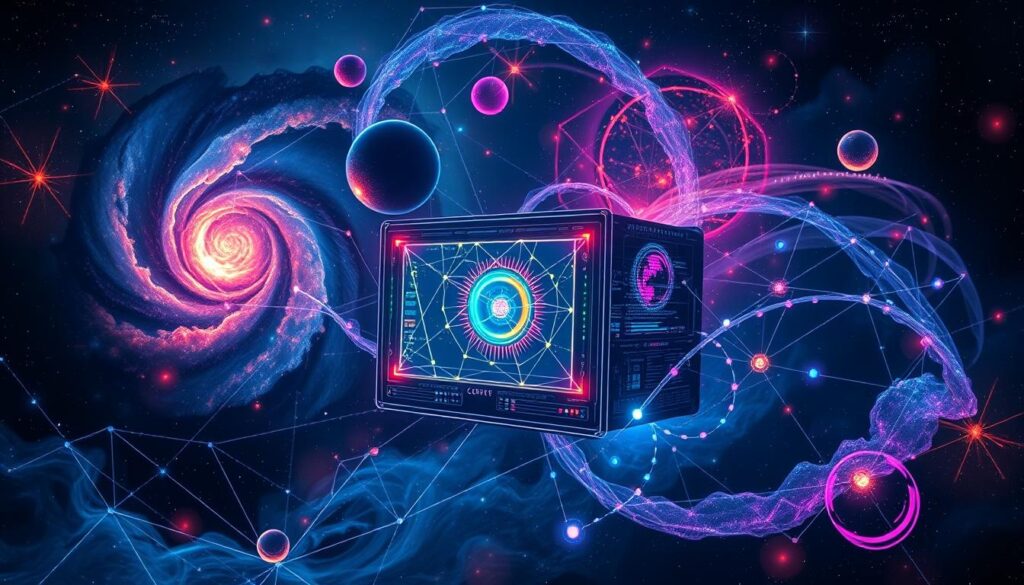The study of the early universe and its evolution is a complex challenge in cosmology. Recent quantum computing advancements have opened new paths for research. Quantum-enhanced simulations are crucial for understanding the universe’s fundamental laws.
Scientists use quantum cosmology to simulate complex phenomena. These simulations help us understand the early universe, the formation of structures, and dark matter and energy. They rely on quantum gravity principles, potentially changing our view of cosmic microwave background radiation.
This article delves into quantum-enhanced simulations and their impact on cosmology. We’ll explore how advanced technology meets the quest to uncover the universe’s secrets.
The Potential of Quantum Computing in Cosmology
Quantum computing has introduced new avenues in scientific fields like cosmology. It leverages quantum mechanics to perform complex tasks that classical computers can’t handle. This quantum advantage could transform how we study the universe and uncover its secrets.
Simulating the universe’s evolution is a major challenge in cosmology. Classical computers find it hard to manage the vast number of particles and interactions. Quantum computers, with their parallel processing and quantum superposition, can handle these simulations more efficiently.

Quantum algorithms, like the quantum Fourier transform and quantum phase estimation, are crucial for cosmological simulations. They enable researchers to delve into the early universe, study dark matter distribution, and explore quantum gravity effects. Quantum computing offers a powerful tool for understanding the universe’s fundamental laws and its origins.
The idea of quantum supremacy, where quantum computers outperform classical ones, is especially promising for cosmology. As quantum technology improves, achieving quantum supremacy in cosmological simulations becomes more feasible. This achievement would be a major breakthrough in understanding the universe.
Quantum computing also enhances the analysis of large cosmological datasets. With the growing volume and complexity of data from telescopes and satellites, quantum algorithms can process and analyze it more efficiently. Quantum machine learning can uncover patterns, detect anomalies, and extract insights from these observations.
The potential of quantum computing in cosmology goes beyond simulations and data analysis. Quantum sensors and enhanced telescopes could lead to more precise measurements of cosmic phenomena. This could open new paths for testing cosmological theories and understanding dark energy and dark matter.
Quantum Algorithms for Cosmological Simulations
Researchers are crafting quantum algorithms for cosmological simulations, tapping into quantum computing’s vast potential. These algorithms use quantum phenomena like superposition and entanglement to tackle complex problems efficiently. The quantum Fourier transform, for instance, is crucial for analyzing cosmic microwave background data. It helps scientists uncover vital information about the universe’s early stages.
Quantum walks are another promising tool for simulating cosmic structure growth. They model the evolution of matter distribution on quantum computers. This allows researchers to study galaxy, cluster, and large-scale structure formation. Quantum annealing, which uses quantum fluctuations to find optimal solutions, is also being explored for cosmological parameter estimation. It promises more precise determinations of key cosmological constants.

Quantum machine learning is being explored to extract insights from vast cosmological datasets. Quantum computing enhances the efficiency of machine learning algorithms in processing and analyzing large datasets. This breakthrough could reveal hidden patterns and correlations in cosmological observations. It could lead to a deeper understanding of the universe’s structure and evolution.
The field of quantum algorithms for cosmological simulations is rapidly expanding. As quantum computing technology evolves, we can anticipate more advanced algorithms. These will enable simulations with unprecedented accuracy and detail. This advancement will help unravel the universe’s mysteries, shedding light on its origins and destiny.
Quantum-Enhanced Simulations for Cosmology Research
Quantum-enhanced simulations are set to transform our grasp of the universe, addressing some of cosmology’s most fundamental questions. They leverage quantum computing to simulate intricate phenomena. This includes cosmic inflation, primordial gravitational waves, large-scale structure formation, and dark energy models.
These simulations allow researchers to explore the early universe’s inflationary period. They seek to understand cosmic structure origins and detect primordial gravitational waves. Predicted by inflationary models, these waves are thought to have imprinted on the cosmic microwave background (CMB) radiation. Quantum simulations aid in testing various inflationary scenarios against CMB data.
Quantum simulations also play a crucial role in deciphering dark matter and dark energy. These enigmatic components dominate the universe’s energy density but are still shrouded in mystery. By modeling their behavior and interactions, researchers can test hypotheses and refine theories. Quantum simulations offer the computational might needed to tackle this complexity, leading to more precise models.
Large-scale structure formation is another domain where quantum simulations shine. They simulate how galaxies and galaxy clusters form from early universe density fluctuations. By comparing these simulations with observational surveys, cosmologists can refine their models. This helps understand the interplay between dark matter, dark energy, and baryonic matter.
The potential of quantum simulations extends to dark energy models. Dark energy, driving the universe’s accelerated expansion, is a profound mystery. Quantum simulations can explore various dark energy models, such as scalar field theories and modified gravity. By comparing these models with observational data, scientists can better understand dark energy’s properties.
As quantum computing evolves, so will the capabilities of quantum-enhanced simulations in cosmology. These simulations will allow researchers to tackle more complex problems, test innovative theories, and expand our understanding of the universe. The synergy between quantum computing and cosmology promises to unveil groundbreaking discoveries, potentially altering our view of the cosmos and our role within it.
Challenges in Implementing Quantum Simulations for Cosmology
Quantum-enhanced simulations are promising for advancing cosmology research. However, significant challenges must be overcome before their full potential is realized. Quantum errors and decoherence are primary obstacles, disrupting the accuracy and reliability of quantum computations. These errors stem from the fragile nature of quantum states and their vulnerability to environmental noise and interference.
To combat quantum errors and decoherence, researchers are developing robust quantum error correction schemes. These methods aim to detect and correct errors in real-time, preserving the integrity of quantum information. Yet, implementing effective quantum error correction protocols is a complex task, requiring careful design and optimization.
Another major challenge is the scalability of quantum hardware. Cosmological simulations need a large number of qubits to accurately model the universe’s complex dynamics and interactions. Current quantum computers are limited in qubit count, restricting simulation size and complexity.
To address scalability, efforts in quantum hardware development focus on increasing qubit numbers and improving stability and connectivity. This involves advancements in qubit fabrication techniques, error correction codes, quantum circuit optimization, and quantum-classical hybrid algorithms.
- Qubit fabrication techniques
- Error correction codes
- Quantum circuit optimization
- Quantum-classical hybrid algorithms
Researchers aim to enable larger-scale quantum simulations by pushing quantum hardware capabilities. This is an ongoing process, requiring sustained research and development to overcome technical hurdles and achieve scalability.
Despite challenges, the scientific community remains optimistic about quantum-enhanced simulations for cosmology. With advancements in quantum error correction, decoherence mitigation, and scalable quantum hardware, these simulations will become more powerful tools for understanding the universe.
Current Research and Breakthroughs
Despite the hurdles, quantum-enhanced simulations for cosmology are making significant strides. Teams globally are pushing the boundaries with quantum cosmology experiments and pioneering quantum simulation platforms. These efforts underscore the vast potential of quantum computing in unraveling cosmic mysteries.
One major achievement is simulating simple inflationary models with quantum circuits. Researchers have successfully replicated the early universe’s rapid expansion with unmatched precision. These simulations shed light on inflation’s role in the cosmos’s large-scale structure.
Another milestone is the development of quantum-classical hybrid algorithms for cosmological parameter estimation. These algorithms blend quantum and classical computing strengths, leading to more precise and efficient parameter estimation. They leverage quantum properties like superposition and entanglement, promising a new era in understanding the universe’s makeup and evolution.
Researchers have also shown quantum speedup in certain cosmological problems. Quantum systems’ inherent parallelism enables faster computation compared to classical methods. This quantum edge offers new avenues for complex simulations and data analysis.
The advancement in quantum-enhanced simulations for cosmology is fueled by interdisciplinary collaboration. The synergy between cosmologists, quantum physicists, and computer scientists is essential. It’s this cross-disciplinary effort that’s crucial for overcoming challenges and unlocking quantum computing’s full potential in cosmology research.
Future Prospects and Potential Applications
Quantum computing’s advancement promises a vibrant future for quantum-enhanced simulations in cosmology. As quantum computers grow in power, researchers will tackle simulations of unmatched complexity and precision. This leap forward will significantly enhance precision cosmology, leading to more accurate measurements and deeper insights into the universe’s essence.
The potential for enhanced gravitational wave detection is particularly exciting. Quantum simulations could simulate gravitational interactions with unmatched precision. This could unveil gravitational waves with unmatched sensitivity, revealing the universe’s most extreme events, like black hole and neutron star mergers.
Quantum-enhanced simulations also hold great promise for dark matter studies. By simulating dark matter’s behavior and interactions within quantum mechanics, researchers might uncover its secrets. These simulations could refine dark matter models, shedding light on its role in galaxy and cosmic structure formation.
Moreover, quantum-enhanced simulations could transform quantum cosmology theories. These theories aim to merge quantum mechanics and general relativity, offering a unified view of the universe. By simulating spacetime and matter on cosmic scales, researchers could test and refine these theories. This could bring us closer to understanding the universe’s origins and evolution.
